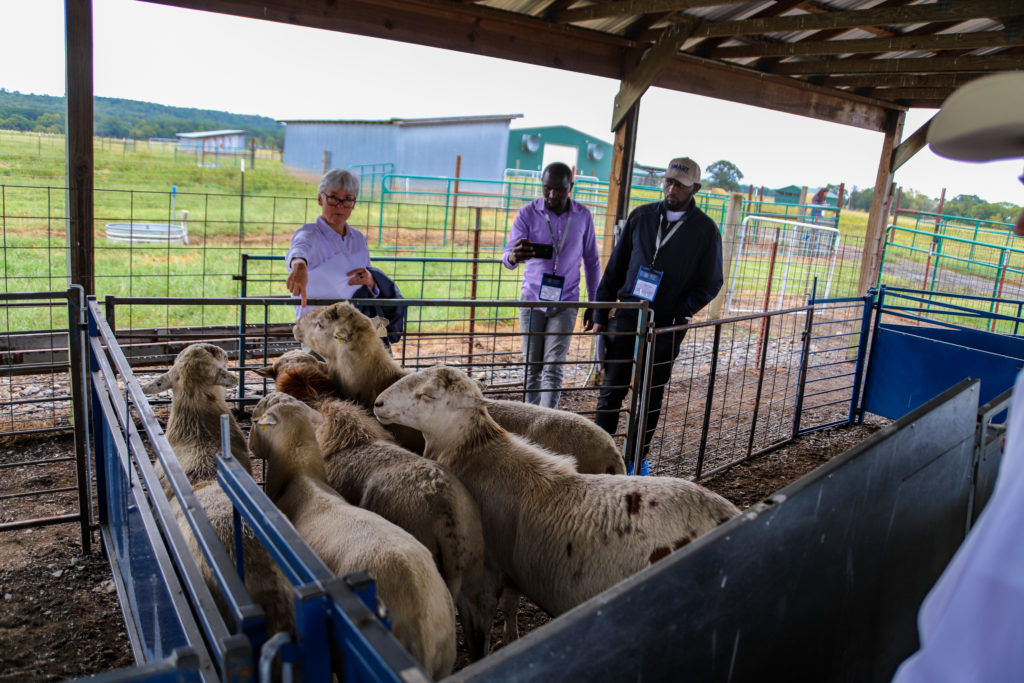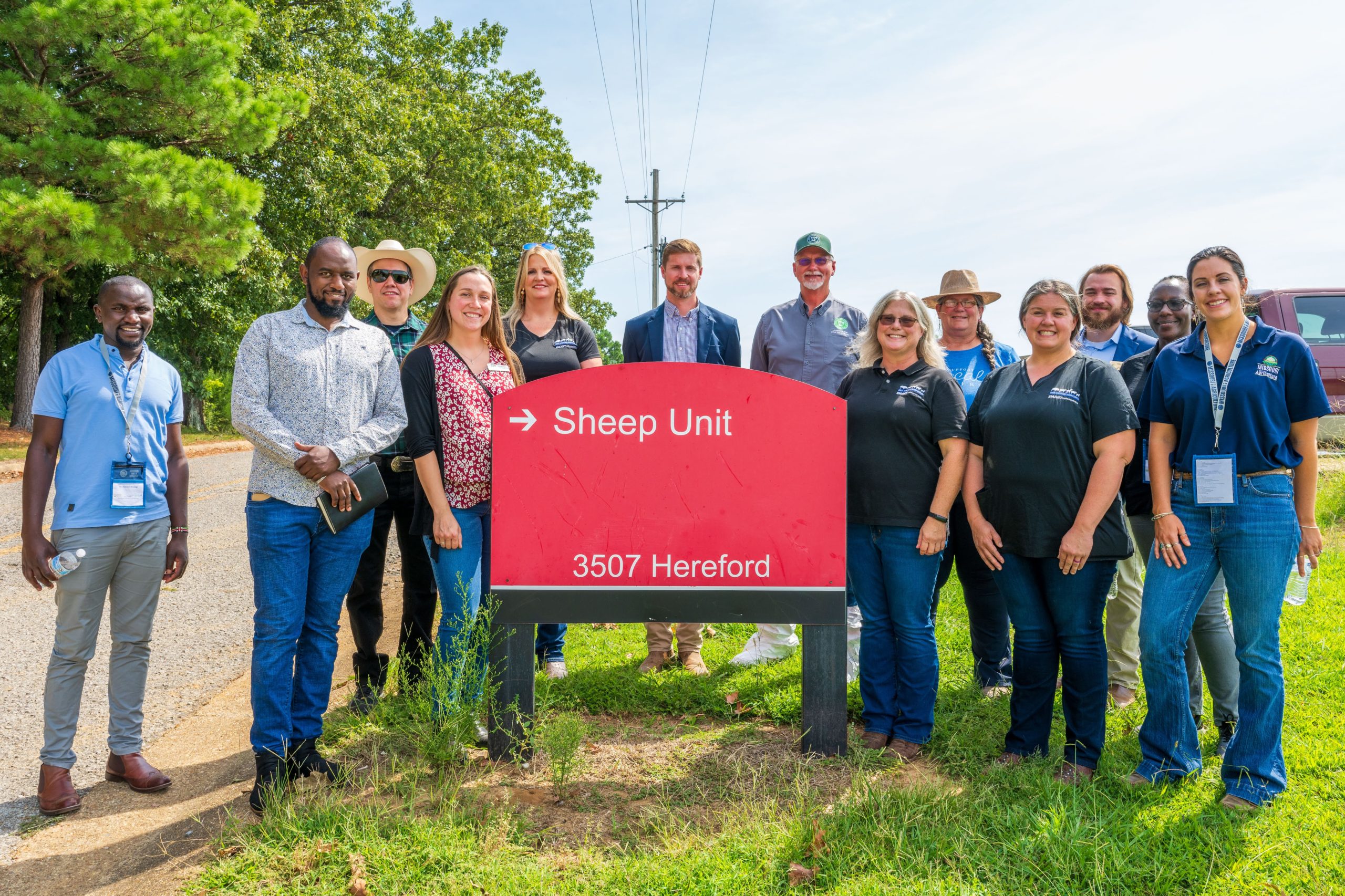Introduction
In a world increasingly interconnected through trade and agriculture, it’s essential to foster collaboration and knowledge exchange between nations. One remarkable event that did just that was the 2023 Missouri Department of Agriculture and SMART Reproduction Kenya Small Ruminants Inbound Trade Mission through advancing small ruminant agriculture through international collaboration This joint venture served as a platform for international agricultural experts to come together, learn, and share insights in the field of small ruminant production. The trade mission spanned multiple days and encompassed various key locations and experiences that left a lasting impact on all participants. In this blog post, we’ll take you through each day of this enlightening journey.
Day 1: A Glimpse into Modern Slaughter Facilities
The trade mission kicked off with a visit to the Arkansas State University Meat Market, nestled within the Arkansas State University College of Agriculture. Representatives from KALRO, Dr. Ruth Waineina, Samson Mwangi, and Nicolas Ngahu, CEO of the Meat and Livestock Industry Council of Kenya, were introduced to a state-of-the-art slaughter facility. Corey Readnour, the A-State Meat Market Manager, led the tour, showcasing the facility’s commitment to animal welfare, worker safety, education, and the production of high-quality meat products for the local community. It was a testament to the importance of maintaining the highest hygienic standards in the meat industry.
Following this eye-opening experience, the group explored the Small Ruminant Production Unit on the same campus. Dr. Jerica Rich, Assistant Professor of Animal Science, provided valuable insights into the sheep and goat herds used for student education, the equipment used, and course offerings related to small ruminants. The day concluded with presentations from Dr. Dan Quadros, Arkansas Small Ruminant Specialist at the University of Arkansas System Division of Agriculture, and Dr. Nilz from the Arkansas Department of Agriculture. These presentations delved into small ruminant production and the broader agricultural industry in Arkansas.
Day 1 also included a tour of SMART Reproduction, where participants had the chance to explore international and domestic storage facilities, the collection center, animal housing, and the export laboratory. CEO Brittany Scott emphasized the center’s rigorous biosecurity standards and their commitment to excellence in small ruminant reproductive physiology and animal care. The event was made even more special by the presence of representatives from Senator John Boozman’s office, showcasing his strong support for U.S. agriculture.
Day 2: The World of Kiko Goats and Innovative Research
The second day began with a visit to Square One Kikos in Redfield, Arkansas. Michael and Jessie Brust presented an enlightening overview of the benefits of Kiko goats and their meticulous selection criteria for animal retention. The group was thoroughly impressed with the quality of their genetics, their seed stock breeding operation, and the informative presentation. Patrick Fisk, head of the State of Arkansas Livestock & Poultry Commission, and Dr. Dan Quadros, Arkansas Extension Small Ruminants Specialist, were also in attendance.
Next on the agenda was the Dale Bumpers Small Farms Research Center in Booneville, Arkansas. Dr. Joan Burke and her team shared groundbreaking research on the Katahdin sheep breed’s parasite resistance selection. The group toured the breeding ewe herd and lambing facilities, gaining insights into the current breeding rams and their Estimated Breeding Values (EBVs). Dr. Phillip Owens, Research Agronomist, presented his work on soil mapping in the Uasin Gishu Plateau, Kenya, highlighting its potential to improve agricultural productivity.
Day 2 ended with a deep dive into continuous data collection efforts at the center, with a focus on parasite resistance. The meticulous cataloging of data by the staff and talented graduate and post-doctorate students ensures a wealth of information for future research.

Day 3: A Focus on Goat Dairy and Feed Mill Operations
Day 3 began with a visit to Broken Cedar Farm Goat Dairy, hosted by owners Dr. Eric Wailes and Dr. Michael Hollomon. The delegation learned about the Saanen goat herd and dairy management practices. The farm’s design, emphasizing animal comfort and worker safety in holding pens and the dairy parlor, captivated all participants.
The second stop was the Tyson Feed Mill in Aurora, Missouri, a state-of-the-art facility. Participants received a comprehensive tour and explanation of the products created from raw commodities, accepted via rail and grain trucks. The tour highlighted worker safety and automation features in production.
The day concluded with a meeting with Dr. David Brown, University of Missouri Extension Small Ruminant Specialist. The discussion focused on the challenges and opportunities in Missouri’s small ruminant production sector, as well as potential collaborative efforts between Missouri and Kenya.
Day 4: Accelerating Genetic Improvement and Sustainable Farming
Day 4 began with a presentation by Dr. Homero Salinas, Assistant Professor at Lincoln University, Missouri, and Extension State Specialist, shedding light on the small ruminant industry.
The next stop was JBJ Livestock in Morrisville, Missouri, where owner Jared Frieze explained his use of embryo flushing and transfer to accelerate genetic improvement in his Dorper flock. The group toured the ewe barn and learned about the importance of rotational grazing in the operation. Dr. Homero Salinas and Kevin Minish, President of the Missouri Sheep Producers, were also present.
The final stop of the day was Up Hill Livestock in Butler, MO, where owner Clay Winder provided a walking tour of his feedlot-style Katahdin sheep production program. The participants gained insights into the feeding regime, working facilities, and lamb production goals for the ethnic market in Kansas City, Missouri.
Closing Day: A Glimpse into Small Ruminant Dairy Production
The trade mission concluded with a visit to Chalivah Nubian Herd in Holden, Missouri, owned by Joe and Kathy House. The hosts generously shared fresh cheese and milk produced from their animals. Kathy reviewed data-backed performance programs coordinated by the American Dairy Goat Association, including Linear Appraisal and DHIA. The group also had the opportunity to tour and evaluate the doe herd hands-on.
The final stop was Green Dirt Farm in Weston, Missouri, a sustainable sheep dairy known for its award-winning cheeses produced from sheep, goat, and cow milk. Founder Sarah Hoffmann highlighted the farm’s commitment to animal health, sustainable grazing practices, and genetic improvement. The group received a complete facility tour, including the flock of approximately 100 animals, milking parlor, and cheese plant. The visit concluded with a cheese-tasting board at Green Dirt Farm’s picturesque cafe, showcasing the economic opportunities of a value-added chain model.
Conclusion: Fostering Collaboration and Knowledge Exchange
The 2023 Missouri Department of Agriculture and SMART Reproduction Kenya Small Ruminants Inbound Trade Mission was a resounding success in fostering collaboration, sharing knowledge, and strengthening international bonds in the small ruminant industry. The insights gained from visits to various operations, research centers, and dairy farms will have a lasting impact on the sheep and goat industries across continents. This event serves as a testament to the power of global cooperation in agriculture, paving the way for a brighter and more sustainable future. We extend our gratitude to all participants and hosts who made this remarkable trade mission possible.

